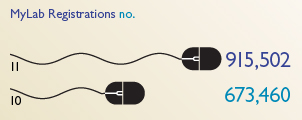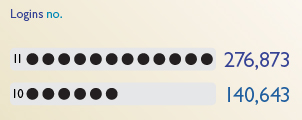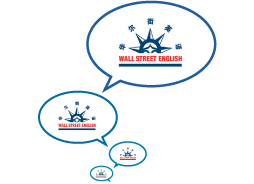International Education
Key performance indicators
| £ millions | 2011 | 2010 | Headline growth | CER growth | Underlying growth |
|---|---|---|---|---|---|
| Sales | 1,424 | 1,234 | 15% | 15% | 4% |
| Adjusted operating profit | 196 | 171 | 15% | 13% | 2% |
Online learning
users

Online learning
logins

International Education
Our International Education company is active in more than 70 countries. It is a major focus of our strategy, and sales and profits have broadly doubled since 2007. Our strategy is to combine educational content, assessment, technologies and related services to help educational institutions become more effective and their students more successful. We expect to benefit from a series of powerful long‑term global trends: increasing public and private spending on education (despite current pressures on public spending in developed markets); growing participation rates; the demand for assessment to provide measures of achievement; the growing technology infrastructure in educational institutions; and the rise of English as a global language. In 2011, we continued to make significant organic investments in expanding the footprint of Wall Street English in China and the roll‑out of our school services business in India as well as incurring significant charges from the integration of acquisitions, most notably the school systems business of SEB in Brazil.
Global highlights in 2011 include:
- Wall Street English, Pearson’s worldwide chain of English language centres for professionals, increased student numbers by 9% to more than 190,000. We opened 19 new centres around the world, bringing the total number close to 450.
- More than 0.9 million students registered for our MyLab digital learning, homework and assessment programmes, an increase of 36%. They included more than 150,000 MyEnglishLab registrations, up 70%, and 28,000 registrations for our high school mathematics programme MathXL, a 54% increase.
- We developed a new model of enterprise‑wide support for online higher education with the University of New England (UNE) in Australia which will launch in 2012. The partnership enables UNE to expand its distance learning capacity and access to higher education and ties Pearson’s revenue to the success of the institution and its students.
- Our Fronter learning management system grew strongly with new contracts won in Malta, Tasmania and Poland. Active users rose by 18% to 1.3 million and their logins by 11% to 154 million.
- Student test volumes for the Pearson Test of English Academic saw robust growth supported by recognition from almost 1,900 institutions including the Australian Department of Immigration & Citizenship and 95% of UK Universities.
- The Organisation for Economic Co‑operation and Development chose Pearson to develop a competency and assessment framework for the 2015 cycle of The Programme of International Student Assessment (PISA) tests, one of the world’s most prestigious programmes of international tests.
Developing markets highlights in 2011 include:
- In China, student enrolments at our Wall Street English centres increased 25% to 53,000, boosted by strong underlying demand and the launch of 11 new centres. Our students continue to rapidly acquire high‑level English skills with average grade levels achieved by our students rising by 11% during 2011.
- We acquired Global Education and Technology Group, a leading provider of test preparation services for English Language and other professional qualifications, for $155m in cash. Global Education has approximately 450 (115 owned and 335 franchised) learning centres in 150 cities across China.
- In South Africa we gained share in school publishing, but market conditions were tougher than expected during a year of major curriculum reform. Student enrolments grew strongly at CTI, up 13% to 8,700, which continues to deliver significantly better completion rates than its peers and strong job placement rates of 70%. We delivered half a million secondary textbooks for Physics, Biology and History to all government secondary schools in Uganda, one million Junior African Writer readers to the Ministry of Education in Sierra Leone and almost two million textbooks in five subjects to secondary schools in Zimbabwe.
- In Brazil, we successfully completed the first stage of the SEB Pearson Sistemas integration with major investments and improvements across the business. Our Virtual Library grew strongly and now reaches two million students across 100 universities, and we entered the K-12 publishing market. In Colombia, we implemented a bilingual teacher training programme in several states and in Chile we won a contract to evaluate the national college admissions test.
- In India, we incurred costs related to the acquisition of TutorVista and invested to grow the business. We have doubled the number of schools managed by TutorVista to 24 and the installations of its multimedia teaching tool Digiclass to approximately 10,000. Vocational and Professional enrolments at our IndiaCan joint‑venture grew more than 50% to 86,000, with particular strength in spoken English, Chartered Accountancy, Engineering and MBA qualifications.
- In the Middle East, our performance was boosted by sales of Reading Street and Scott Foresman Math in Saudi Arabian schools; Giancoli Physics and Thomas Calculus along with strong MyLabs uptake in Turkish colleges; and Haeussler Mathematics and Hubert Engineering along with strong MyLab redemptions in Egypt.
United Kingdom highlights in 2011 include:
- Our UK business made solid progress during the year despite significant regulatory and policy changes in its markets, most notably in vocational and general qualifications, apprenticeships and in higher education.
- We marked more than 5.7 million GCSE, A/AS Level and other examinations with 90% using onscreen technology. We marked more than 3.8 million test scripts for over half a million pupils taking National Curriculum Tests at Key Stage Two in 2011 and have been selected to mark tests in 2012.
- Our Bug Club digital reading programme for primary schools combines engaging phonics‑based books with games, assessments and teacher diagnostic tools to boost reading enjoyment and comprehension. In 2011, more than 145,000 online users in almost 900 schools subscribed to Bug Club online.
- We acquired EDI plc, a leading provider of education and training qualifications and assessment services, with a strong reputation for the use of information technology to administer learning programmes and deliver on‑screen assessments. Registrations for our own BTEC Apprenticeships more than doubled to 80,000 students.
Rest of World highlights in 2011 include:
- We launched the Australian edition of our pioneering US digital maths curriculum, enVisionMATH. We have more local versions in development to bring high quality digital curriculum to new markets across the globe.
- In Italy, our new digital curriculum helped us gain significant share in lower secondary adoptions and to see good growth overall.
- In Germany, we acquired Stark Holding, a leading provider of education materials including test preparation resources for pupils and teachers.
- In Japan, we faced major disruption following the March 2011 tsunami but maintained operations and achieved notable successes, particularly with the Versant Test of Communicative English and the launch of BTEC.




